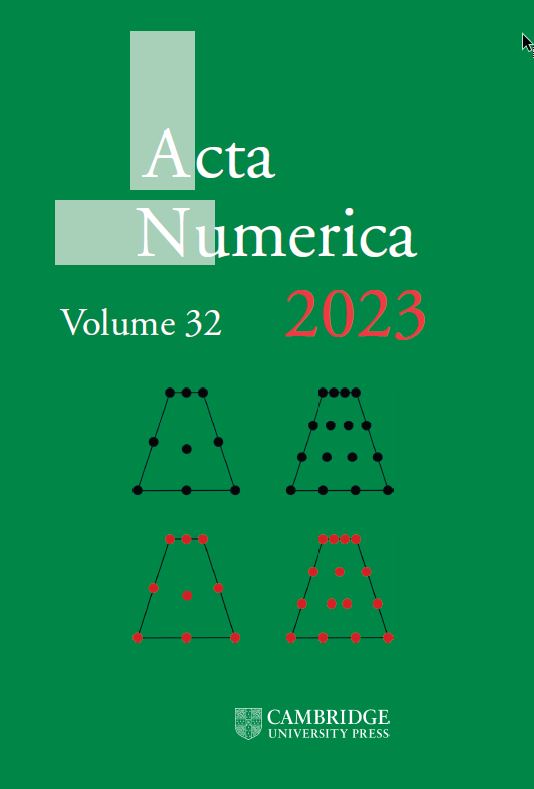克服分子动力学中的时间尺度障碍:转移算子、变分原理和机器学习
IF 11.3
1区 数学
Q1 MATHEMATICS
引用次数: 7
摘要
分子动力学的主要挑战之一是克服“时间尺度障碍”:在许多现实分子系统中,生物上重要的罕见跃迁发生在无法直接数值模拟的时间尺度上,即使是在最大或专门的超级计算机上。本文讨论了如何通过一系列基于传递算子的技术来规避时间尺度障碍,这些技术在过去二十年中出现在动力系统理论、数值数学和机器学习中。我们将专注于如何使用转移算子来近似长时间尺度上的动力学行为,回顾这种方法在分子动力学中的引入,并概述各自的理论以及算法发展,从早期的基于数值的方法,通过变分公式,涉及利用和改进机器学习概念的现代基于数据的技术。此外,还将解释它与罕见事件模拟技术的关系,揭示分子动力学中长时间量的变分原理的广泛等价性。这篇文章将主要从数学的角度出发,并将把对现实世界分子系统的应用留给已经撰写的1000多篇关于这一主题的研究文章。本文章由计算机程序翻译,如有差异,请以英文原文为准。
Overcoming the timescale barrier in molecular dynamics: Transfer operators, variational principles and machine learning
One of the main challenges in molecular dynamics is overcoming the ‘timescale barrier’: in many realistic molecular systems, biologically important rare transitions occur on timescales that are not accessible to direct numerical simulation, even on the largest or specifically dedicated supercomputers. This article discusses how to circumvent the timescale barrier by a collection of transfer operator-based techniques that have emerged from dynamical systems theory, numerical mathematics and machine learning over the last two decades. We will focus on how transfer operators can be used to approximate the dynamical behaviour on long timescales, review the introduction of this approach into molecular dynamics, and outline the respective theory, as well as the algorithmic development, from the early numerics-based methods, via variational reformulations, to modern data-based techniques utilizing and improving concepts from machine learning. Furthermore, its relation to rare event simulation techniques will be explained, revealing a broad equivalence of variational principles for long-time quantities in molecular dynamics. The article will mainly take a mathematical perspective and will leave the application to real-world molecular systems to the more than 1000 research articles already written on this subject.
求助全文
通过发布文献求助,成功后即可免费获取论文全文。
去求助
来源期刊

Acta Numerica
MATHEMATICS-
CiteScore
26.00
自引率
0.70%
发文量
7
期刊介绍:
Acta Numerica stands as the preeminent mathematics journal, ranking highest in both Impact Factor and MCQ metrics. This annual journal features a collection of review articles that showcase survey papers authored by prominent researchers in numerical analysis, scientific computing, and computational mathematics. These papers deliver comprehensive overviews of recent advances, offering state-of-the-art techniques and analyses.
Encompassing the entirety of numerical analysis, the articles are crafted in an accessible style, catering to researchers at all levels and serving as valuable teaching aids for advanced instruction. The broad subject areas covered include computational methods in linear algebra, optimization, ordinary and partial differential equations, approximation theory, stochastic analysis, nonlinear dynamical systems, as well as the application of computational techniques in science and engineering. Acta Numerica also delves into the mathematical theory underpinning numerical methods, making it a versatile and authoritative resource in the field of mathematics.
 求助内容:
求助内容: 应助结果提醒方式:
应助结果提醒方式:


